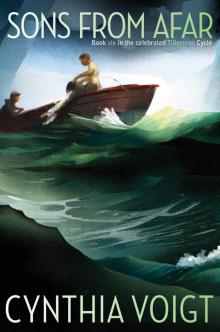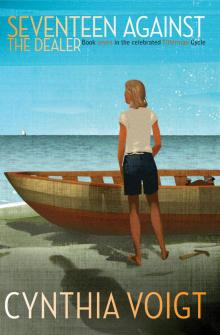- Home
- Cynthia Voigt
Elske Page 16
Elske Read online
Page 16
The floor underfoot—moving—made her stumble clumsily. Beriel promised, “You’ll get your sea legs soon, Elske, but until then, be careful. Hold on.”
Elske hung on, climbing up the ladder, and scurried to the side of the boat where she could hold on to the railing. The sharp wind blew away her own chills; the taste of salt water on the air moistened her mouth and cheeks. Beriel went off with Nido to look at the section of the stern deck the captain had set aside for her particular use, but Elske stayed where she was and saw the city falling away behind them as the river emptied its waters into the open sea. They sailed out into this open water, until the islands that hugged the shore blended into the mainland, and all together they lay like a flat grey cloud along one horizon. Off to the west the sea moved empty, endless, as the boat sailed southwards. But by the time the sun was lowering itself behind the shelter of land, they had come back close to land, and they dropped anchor in a small cove on one of the islands.
After eating they went below, to sleep. Beriel’s bunk had a thin straw mattress, but Elske wrapped herself around in a blanket and climbed into a hammock. This bed swayed with the waters that rocked the boat, and Elske woke many times, and slept again, until at last she could see lightening in the sky outside. Then she rolled herself quietly out of the hammock and let herself quietly out of their small room, and climbed in quiet stockinged feet up the ladder.
The ship was getting under way. Long slow waves rolled under her, lifting her bow and lowering it. The ship was like some snared bird, struggling to rise, but falling.
Elske leaned against the railing as the ship rose and fell under her. The cook had a steaming cauldron set out on his stone hob, but her stomach disliked the smell of food. She would have liked fresh water, though. She walked off-balance over to the helmsman to ask if there was any water. “Are ye blind?” he asked, laughing at his wit.
Elske could only smile, and he relented. He pointed to a barrel at the boat’s midsection. A wooden ladle was tied at its side, and she thanked him.
Water cooled her mouth, and moistened it. The wind blew from behind her, lazily, and clouds covered the sky. The deck rolled under her feet, and her legs felt weak.
Elske had just seated herself on cushions provided in their section of the stern, had just closed her eyes, when she was called to answer Beriel’s summons. She went slowly down the ladder, feeling that if her feet slipped on the rungs her arms would lack the strength to catch and hold her. In the dark companionway the air was close, and in their cabin, too. Beriel wanted the chamber pot emptied. “Unbolt the shutter,” she instructed, “and empty it out of the porthole.”
The swaying rolling surging of the ship was stronger, below, and also slower. Elske felt sick, but not with fever; it was as if she had swallowed into her stomach something which it did not wish to keep. A cold sweat misted her face. She turned around to return the chamber pot to its hook under Beriel’s bunk—but brought her stomach up into it, instead.
She knew she was vomiting. She had seen men at the Volkking’s feast empty their bellies of honey mead and meat. But she did not remember ever having done so herself.
“Elske! Don’t—! What—?” and then Beriel laughed. “You’re seasick. I never was, not even in storms. Come, you have to get into fresh air. There will be no getting over it if you stay here below. Come,” and she lifted Elske onto her feet, then pushed her out the door.
Elske hauled herself back up the ladder.
It was the same clouded sky overhead and the same wood decking underfoot, and Elske fell back onto the same cushions from which she had arisen when summoned. There she spent the long day. Sometimes Beriel was nearby, and sometimes Elske dozed uneasily, and sometimes she stumbled to the barrel for a mouthful of water, and often she leaned over the railing to vomit. In the afternoon, Nido came to sit with her. He had none of his customary liveliness and she knew that he, too, had caught the seasickness. When the ship rode at anchor in protected waters that evening, Elske felt more herself, although she did not eat. Beriel offered consolation. “Seasickness only lasts a day or two in this gentle weather.”
Elske waited for the named time to pass. Nido was his usual self again after only a day, and in two days had forgotten that he ever shared Elske’s misery. Elske, who had never before had any such misery, had enough now to share with any who asked. She lived on deck, in the fresh air, and refused to go below, even in rain. She slept out on the deck, also, because even at anchor the ship swayed with the movement of the water. After a few days, she found she could keep some of the evening meal down. “That’s a good thing, or you’d starve. The captain says there’s some, the sea always brings up their stomachs,” Beriel reported, scraping clean her own bowl of stewed fish.
Elske waited three days, then four, five.
Eight days, then nine, ten—
“Do you never complain?” Nido asked her. “You look like you’re dying, all pale and greeny. How can you stand it?”
Elske endured. Beriel grew impatient with her, and restless, too. “This ship is twenty paces long, and I’ve walked it a hundred times. More than a hundred. I’ve explored into every cabin—although the captain was none too pleased to show me his, and he doesn’t know I could find his strongbox where he thinks it’s so well-concealed. I’ve counted every piece of cargo. Don’t you want to know what we’re carrying, Elske?”
“No,” Elske said, but at the sight of Beriel’s bored displeasure she found words in her throat to add, “Later, perhaps. Perhaps tonight.”
“Tonight I’ll be tired, sleepy not restless. I need to tell you now. There are a dozen barrels—hidden away under the stacks of furs. Barrels the same size as they store ale in but marked by dustings of fine, dark powder. Do you know what I think we are carrying?”
“Later,” Elske answered, and Beriel went off to join Nido at his work of repairing one of the chairs from the captain’s cabin.
“You look terrible,” everyone said to her, and Elske smiled weakly, and nodded her agreement, unable to speak. The times she felt well enough for company, most of the others were asleep, except for whichever sailors stood the watch; those men made her companions of the journey. The ship rode quietly at night, and by dawn Elske often felt entirely well. Now that she knew sickness, she could recognize and name this well-feeling, and take pleasure in it, too. Until the ship raised anchor and set sail again.
As they moved southwards, into spring, spring rushed northwards to greet them. When they were not more than a few nights from Trastad, the night air warmed enough so that Elske was never wakened by the cold. When they were at almost two sennights’ distance, Elske could smell on a light wind, blowing off the land, the sweetness of flowers. In Trastad, when a flower came into bloom, if you bent over it you could just catch its perfume. Here in the south, the air itself was flowered. “Does it always smell so, the southern air?” she asked Beriel.
“It’s only spring,” Beriel answered, but this was Elske’s fifteenth spring, and this was more than spring.
And then one afternoon, while sunlight poured down over the deck of the ship and the sails thumped sullenly on their masts, she could see a cluster of buildings on the distant shore, where a wide river entered. Behind the houses, a dark forest spread backwards, so thick and heavy that it seemed to be pushing the little wooden buildings into the water. That day the captain lingered far out to sea, and it was almost full dark before he brought the ship close in, to anchor. Nido explained to Elske, “That town has no name, but all know to keep a distance from it. They’re thieves, pirates—and they sell slaves. They can be bribed, sometimes, if your cargo means less to them than gold, but they always choose to board and take Trastader vessels.”
“This is where I go ashore, Nido,” Beriel announced.
“My Lady, you can’t go to shore here. What kind of a man do you think my captain is, to leave two unescorted women here? What kind of a fool do you think him, to put himself in danger by lingering at this place?”
&
nbsp; Beriel didn’t hesitate. “Enough of a fool to transport barrels of what looks like ground charcoal into the south, but which someone might—or might not—guess to be black powder,” she said to Nido’s surprised face. Then she added, “I wonder if the Council knows what Var Kenric is shipping into the south, or why one of Var Kenric’s near relatives has been given the position of assistant carpenter, when he hasn’t completed four years of his apprenticeship and the requirement is for seven. I wonder if Var Jerrol—who is the eyes and ears of the Council—can have been kept ignorant of this merchandise or if it isn’t, instead, his own, alone or in partnership with Var Kenric, and the Council kept blind and deaf on this matter. Tell your captain this, if he objects, and tell him that I require to be delivered onto land in the morning. Your ship is safely south of Pericol and we will make our further way by ourselves. Isn’t that right, Elske?” Beriel asked.
Elske agreed. She would have agreed to anything that marked the end of this terrible journey.
Chapter 14
WHILE NIDO WAS ROWING THEM to shore in the morning, Elske watched the ship fall back, and away. The curved wooden sides rose high out of the water, and the tall masts stretched up into a pale sky. Nido’s oars dipped and pulled in the water. He tried to persuade Beriel to sail on to Celindon, to make a safer journey from that city, but his words affected her no more than the slapping of the waves affected their little boat. When he’d pulled the little boat up onto a narrow beach, Nido gave Beriel his hand, still making his quarrels. “Leave me,” Beriel answered him, and he obeyed.
Beriel was impatient. “Come along,” she commanded Elske. “What are you doing?”
“Looking back,” Elske said. She had looked back over the distance to flames, leaving the Volkaric, and now she looked back to sails being raised, leaving Trastad.
“It’ll take us the better part of the morning to reach Pericol and I’d like to be far from that place before dark has fallen,” Beriel said. “Take up the pack.”
But Elske had started to undress, letting her overskirt fall to the ground.
“Now what are you doing?”
“Putting on the trousers. I can make you a pair, in a day; we could delay that day. It would be safer to travel as a pair of young men, wouldn’t it?”
“I doubt anything could keep us safe from these citizens of Pericol who try everything—rape and robbery, and there are some who enjoy torture, or we might be sold into slavery. I know them. If Josko is still their King, I’ve dealt with him before, but if he has been killed—”
“Who would kill the King?”
“Any one of these cutthroats who thought he could get away with it. But Josko is strong, and cruel, a madman in a fight they say. Also, he makes fair judgements, and even thieves and pirates prefer some order in their lives, in their home city. Even thieves and pirates like to keep their possessions and women to themselves. So they allow Josko to rule over them.”
“None would have dared to attack the Volkking.”
“Josko has his protections. He has Wileen, and although a man might leave Josko sitting in his own blood, he knows he must then deal with Wileen—who would take revenge.”
“Why would you know such people?” Elske tied her trousers at the waist.
“He held me captive the first time I came through Pericol, to go to Trastad. But Josko enjoyed a bold child. Who was a girl child. Who paid her own ransom. Who claimed to be Queen, and could make him laugh.”
“Perhaps then you should wear trousers, my Lady, now that you aren’t a child.”
“A Queen,” and here Beriel paused, as if troubled for the way to speak it, “must always be seen to be a Queen. I will never be otherwise.” She looked at Elske, in trousers and the Wolfer boots, her shirt hanging out loose and her cloak draped over one shoulder. “You’ll do for my escort, perhaps; and it is well for you to try, for I’ve never treated with Josko and not had soldiers nearby. Tie your hair back, and now can we go?”
They scrambled along the land’s edge, which was sometimes stony outcropping, sometimes stony beach, and every now and then a shallow cove with a narrow pebbled beach at its heart. Elske followed Beriel, her feet too warm in the boots but too softened by the years in Trastad for barefooted comfort. She had the pack slung across her back, carrying Beriel’s clothing as well as the maps Beriel had copied from those Var Vladislav kept. What wealth they had, Beriel carried in three purses. The lightest purse was at her waist. She had one not quite so light hidden under her skirt, at the side. The third and richest purse was in fact the hem of her skirt, which Elske had sewn up in little pockets for storage of coins, and golden chains, and the heavy medallion, the best of her wealth. Before leaving Trastad, Beriel had purchased a knife for Elske, and she carried her own; they wore their weapons sheathed, but only half hidden.
Beriel had said it was unwise to show weapons too openly in Pericol. That might be taken as a challenge, or a threat, or even a game; but games in Pericol were as deadly as challenges and threats. Also, it was unwise to appear helpless, if you wanted to reach Josko safely.
“We will have to see him,” Beriel said, picking her way over the stones which the withdrawing tides had left damp and slippery. She held her skirts up, but they were still wet, and dark with mud. “Only he can offer us the mounts we need and make it easier for us to supply ourselves at a fair price. That is,” Beriel laughed, “fair price in Pericol. Even the profit-mongering merchants of Trastad would be ashamed to take what the tradesmen of Pericol demand for their goods.”
“Do they receive what they demand?” Elske wondered.
“It depends on how desperate the need. It’s cheaper, often, to murder than to purchase; and the tradesmen know this, too.”
Like the Volkking’s stronghold, Pericol had no outlying farmlands, although there were a few huts—small gardens spread out before them, fishing nets spread out to dry on straw roofs—huddled together at the shore. Then there appeared a dirt path.
Beriel led Elske along this path, which kept them to single file through dense and overgrown woods before it became broad enough to walk abreast on, as it ran between crowded wooden buildings and became a muddy street. Branches and logs had been scattered along the street to make it firmer underfoot. There were no fences, no flowers, no trees in Pericol. Pericol was mud streets and log houses, two stubby docks and a single well; they could have crossed the city in no more time than it took the sun to rise.
It was midday by the time they entered the city, and the citizens were just stirring awake. Shutters were thrown open, and men called to one another from doorways, rubbing their faces and urinating. The sky had filled with clouds but the air was still warm. Elske followed Beriel.
Beriel walked without haste or hesitation, her shoulders high. Some of the men in doorways called out to her, but they did not approach. Women called out at her from windows, hooting and mocking; they called to Elske, too, as if she were a young man. Elske walked behind Beriel, as unresponsive as her mistress.
The muddy street twisted down to a broad river, where low, marshy islands floated on glassy water. On the opposite bank, more log houses could be seen. Some coracles were tied up to ramshackle docks, and some masted boats as well, such as a fisherman might take out into the sea. A sign with two gold coins painted on it hung over a doorway, and there Beriel entered.
Elske followed.
The room they entered was lit by many candles, some in lanterns hung on the walls, some standing in a pool of their own wax on wooden tables, some set into wooden rings, like the wheels of wagons, hung down from the ceiling. The air was thick with the smell of ale mingling with smoke from the open fire, odors of roasting meat, sweat, cheese, privies and damp riverside mud. The room was crowded with people, mostly men, lounging on benches along the walls, or gathered around long wooden tables.
At Beriel’s entrance, the noise ceased and every eye was fixed upon her.
Beriel ignored this greeting and moved into the room, winding between tables
. The noise rose up again like waves around them as Elske followed.
Beriel crossed the room towards a closed door. Following, Elske looked around at drinking men and women with their breasts half pushed out of their bodices. In a back corner, three men looked with hatred across the table at a fourth; but he was not uneasy. Near them, a man and a girl leaned back against a wall; he offered her a coin. In the shadow of the balcony, two men held a third with a knife to his throat and a hand over his mouth. The third man’s eyes wept with fear and fury; his hands couldn’t reach to the sword at his side, for they were pinned back behind him; his booted feet kicked out, and his captors backed away, mocking. He was a young man, bearded, and his red hair shone like fire out of the shadows in which he struggled to save his life. At one of the tables in the center of the room, a grey-haired woman—looking like one of the distinguished Varinnes of Trastad—dealt out cards to narrow-eyed men, who tossed their wagers into a bowl she had set before her. At another table, two women sat on the laps of two men and all four laughed openmouthed, and drank from tankards.
Beriel was observed, but not questioned. She was watched, but not accosted. Everything about Beriel declared that she had a purpose and a right to be where she was, going whence she went. Elske followed in the wake of Beriel’s passage, looking all about her.
The door opened before Beriel had raised a fist to knock. A man stood framed in it, his face bright with greeting. His thin brown hair was tied back, his grey-brown beard was trimmed short, and his smile showed brown teeth. He held out a hand and Beriel put hers into it.
The room behind watched all of this.
The man wore a dark tunic, not clean, and tights. A sword hung at his side and he had a pair of knives in his belt. He wore golden rings on his fingers and golden hoops in his ears. Raising Beriel’s hand to his mouth, and bowing over it, he watched the room behind her.

 The Runner
The Runner By Any Name
By Any Name Bad Girls, Bad Girls, Whatcha Gonna Do?
Bad Girls, Bad Girls, Whatcha Gonna Do? Mister Max: The Book of Lost Things: Mister Max 1
Mister Max: The Book of Lost Things: Mister Max 1 The Wings of a Falcon
The Wings of a Falcon Bad Girls in Love
Bad Girls in Love Toaff's Way
Toaff's Way Building Blocks
Building Blocks Orfe
Orfe Tell Me if the Lovers Are Losers
Tell Me if the Lovers Are Losers It's Not Easy Being Bad
It's Not Easy Being Bad The Book of Kings
The Book of Kings Dicey's Song
Dicey's Song A Solitary Blue
A Solitary Blue Tree by Leaf
Tree by Leaf Sons From Afar
Sons From Afar Teddy & Co.
Teddy & Co. Jackaroo
Jackaroo Elske
Elske Izzy, Willy-Nilly
Izzy, Willy-Nilly Come a Stranger
Come a Stranger Mister Max: The Book of Secrets: Mister Max 2
Mister Max: The Book of Secrets: Mister Max 2 Seventeen Against the Dealer
Seventeen Against the Dealer The Callender Papers
The Callender Papers The Vandemark Mummy
The Vandemark Mummy Tale of Birle
Tale of Birle Glass Mountain
Glass Mountain The Tale of Oriel
The Tale of Oriel The Book of Lost Things
The Book of Lost Things The Book of Secrets
The Book of Secrets Tale of Gwyn
Tale of Gwyn